As Nataliya Shevchenko's clear voice sounds through the living room, the faces of the six Ukrainian soldiers turn away from the singer. They look at the floor, then at the wall and briefly back at Shevchenko (24). They swallow their tears and some of them get moist when they sing:
“You are my hope and faith
Although it is scary and gray
You are my only way
The path to victory
The air raid siren is sounding again
It is not an easy road.”
Four other musicians in army clothing – also soldiers – watch in the civilian home outside Kharkiv. As a traveling music company, the five artists travel in a passenger bus past soldiers in the northeastern Ukrainian province of Kharkiv. Everyone plays their own repertoire. Their actions are part of the mental and psychological support that the Ukrainian armed forces provide to soldiers.
While the six soldiers had to swallow Shevchenko's music, five minutes earlier they enthusiastically joined in with the blues and rock 'n' roll of Oleksandr Remez, who sang:
“Chaplain,
May my bullets (holy bullets)
Fly quickly straight to the target
Lest fate
Will not pass
To those who bring pain to our home.”
The soldiers stomp softly on the ground. Their heads bob to the rhythm. 'Chaplain' is a soldier's song written by Remez (39). He himself also fought in the war and in the song asks through the chaplain whether there is a higher power that can drive the Russians out of Ukraine. On the upper arm of his sleeve he wears a patch of a soldier with angel wings holding a guitar.
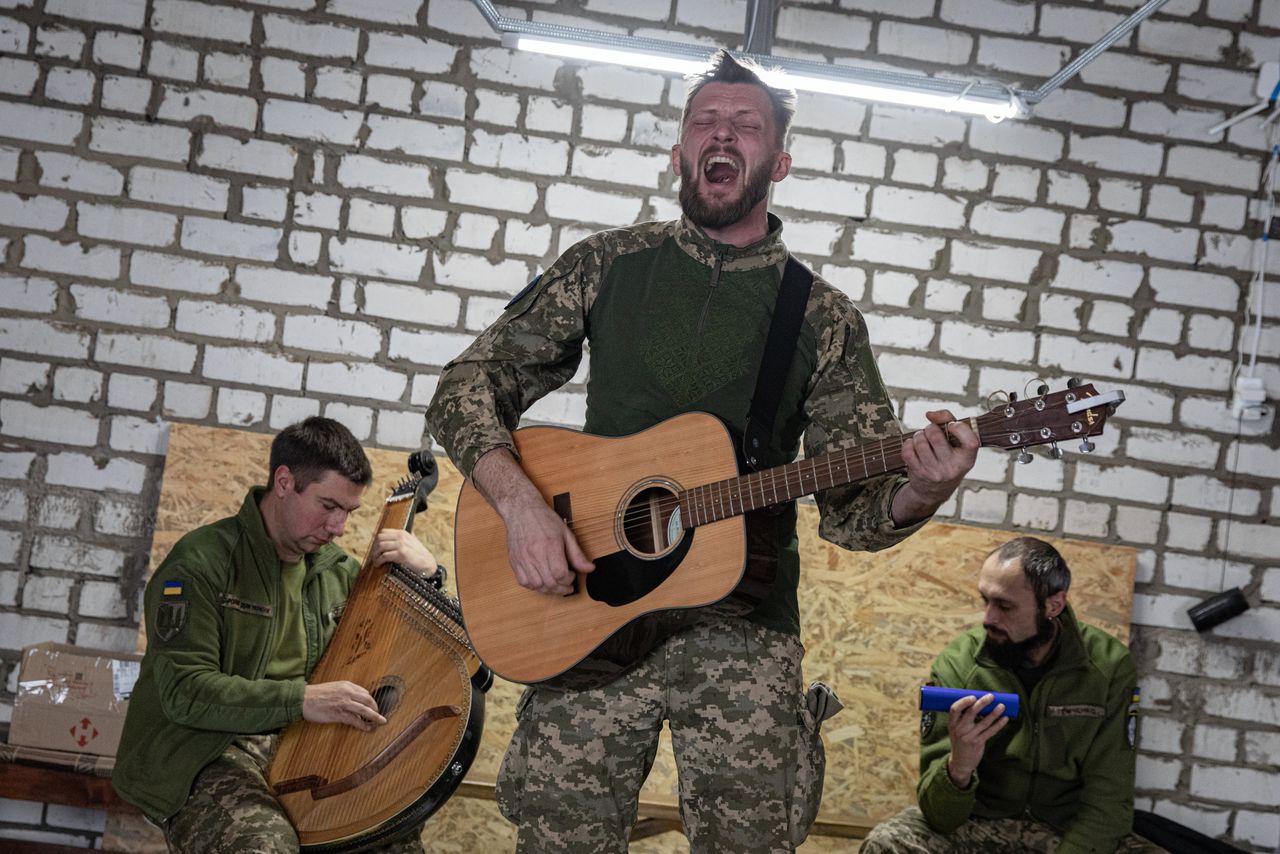
Oleksandr Remez (39) sings and plays blues and rock 'n' roll. Remez himself also fought in the war.
Photo Kostyantyn Chernichkin
Remez describes the soldiers as steely men who block their emotions in the army. And the Ukrainian man, he continues, is certainly not quick to express his feelings. They can express their emotions in music. “With a psychologist it can take hours before you trust each other,” he said earlier in the passenger bus on the way to the first performance of the day. “A song touches you within two minutes. Sometimes the soldiers cry.”
The six soldiers listen in the living room on two beds and a chair. The musicians visit them in their temporary home. The owner has fled the war. His black and white family portraits hang on the wall. A blue stuffed animal lies on a soldier's bed. Two sturdy army boots are drying over a stove. Towels and gloves hang on a clothesline inside. Stacks of canned food in boxes. The six soldiers sleep, live and work here, away from the outside world. The name of their unit and their location must remain secret for security reasons.
/s3/static.nrc.nl/wp-content/uploads/2024/01/05112650/web-0501BUI_Floris-muziek-soldaten-4.jpg)
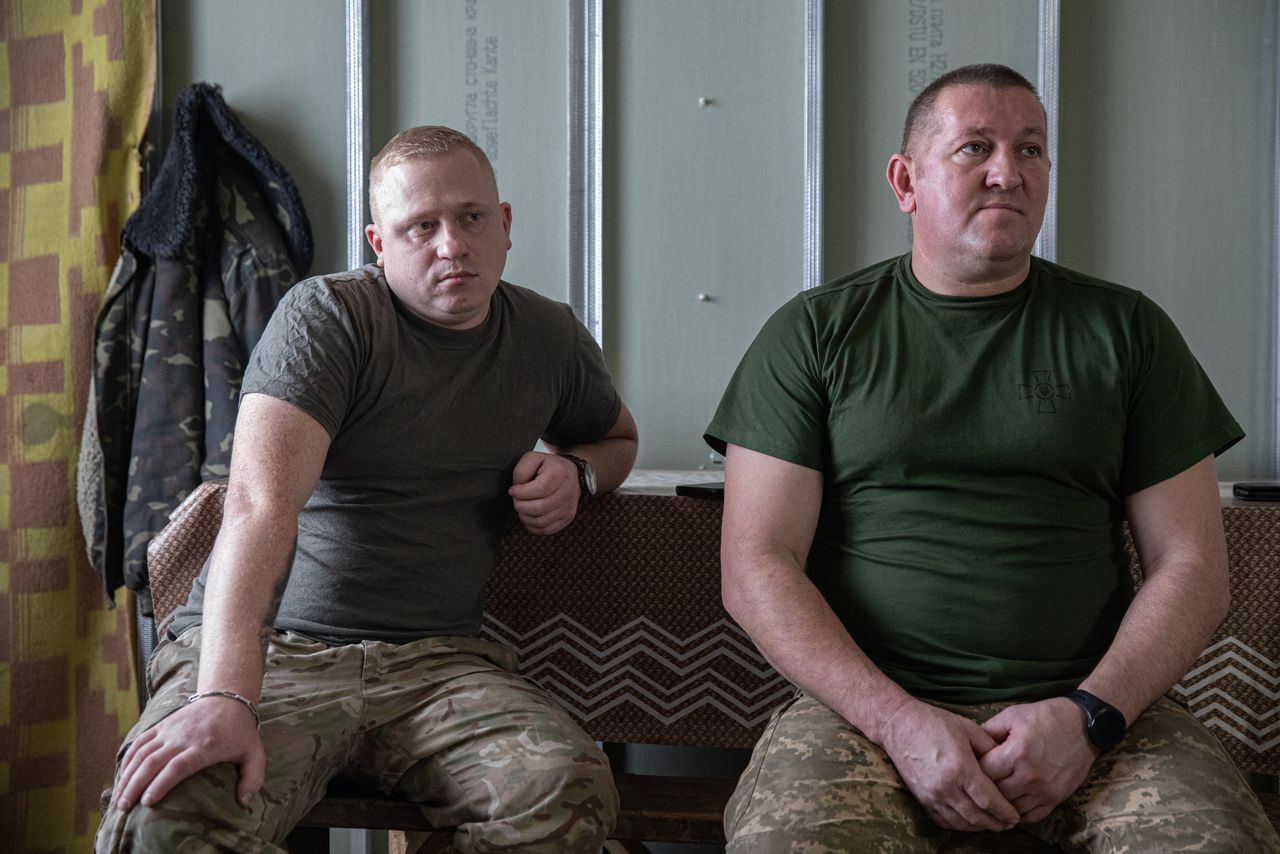
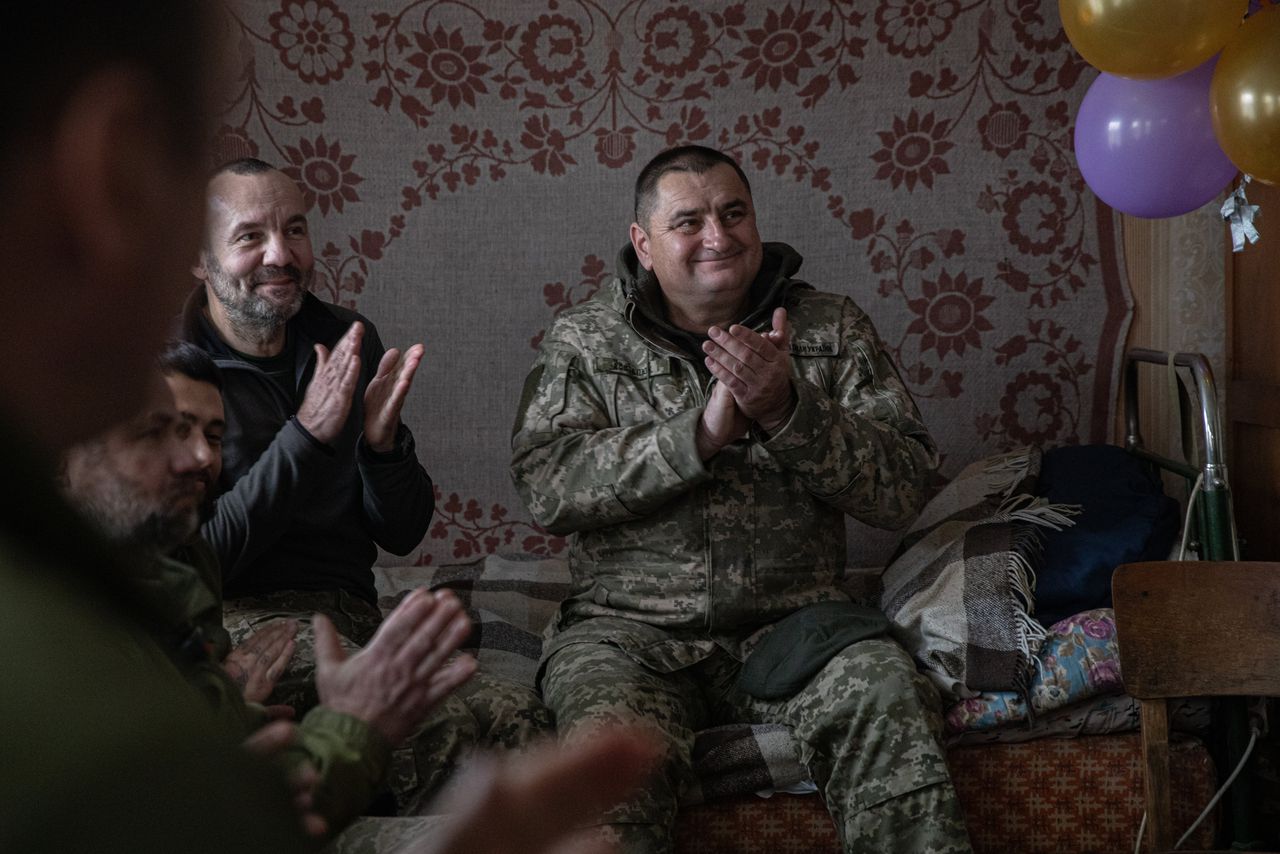
Soldiers, now in the role of audience for music.
Photo Kostyantyn Chernichkin
Concert in a bomb shelter
It's a private concert. The musicians perform for a small audience. That could be two soldiers, but also nine, like later in the day. A performance with dozens of soldiers as spectators in an open place carries too much risk of a Russian attack.
Later in the week the musicians will perform for ninety soldiers in an air raid shelter. They don't play close to the front. That's too dangerous.
Last year, a Russian rocket attack killed at least twenty Ukrainian soldiers during a military ceremony. And, at a funeral ceremony for a soldier, 59 Ukrainians died due to a Russian bombardment. During the war, Russian soldiers were also killed in Ukrainian attacks during gatherings, such as at a concert.
“Cold days, hungry and dull,
snowing like a dream
You know, the night will pass,
And you still hug me
I love you!”
Shevchenko's voice fills the living room. The singer sings her second song. It is no coincidence that it is a woman who sings here. “Then the men know who they are fighting for,” says Remez. “The man protects the woman. That's how it works in Ukraine.”
/s3/static.nrc.nl/wp-content/uploads/2024/01/05105926/data109774166-e54ade.jpg)
Shevchenko sees it as her mission to sing among the soldiers. She is the only citizen and travels with the other musicians for a week. Shevchenko feels like the liaison between the women left behind and the soldiers. She has previously performed for Ukrainian soldiers. “I can't just sit at home,” she says in the passenger van. “I need to do something. I'm standing among the women. I convey their concerns, their pain, their love.”
So she starts her performance with a short speech to the soldiers. “Life without you is no life.” She looks at the soldiers. “Every day we wait for you to come home. We will never let go of each other after that. Your daughters, your mother, your wife, your girlfriend, your sisters – we are all waiting for you with the children, for victory and to live happily together.”
With her action she touches soldier Serhi Kovtalyuk (50). A well-built man, soft-spoken. His eyes become moist during Shevchenko's performance. “She sang with all her heart,” he says afterwards. “I thought about my three daughters. Music brings life.”
Traditional string instrument
Consideration has been given to the performances and the structure of the concert, which lasts more than an hour. All songs are in Ukrainian. At the beginning of the concert, the six soldiers listen impassively and attentively to Taras Stoljar and his bandura, a traditional Ukrainian stringed instrument. Stoljar (46) plays instrumentally including 'Nothing Else Matters' by Metallica – the American metal band supports Ukraine – and 'Shchedryk', a famous Ukrainian Christmas carol.
In his introduction, Stoljar emphasizes the importance of the bandura as a national symbol of Ukrainian identity. “Only Ukrainians have such an instrument,” he says. The soldiers timidly applaud his actions.
/s3/static.nrc.nl/wp-content/uploads/2024/01/05121454/web-0501BUI_Floris-muziek-bandoera.jpg)
Stoljar's bandura should emphasize the bond with Ukraine as a motherland. After him, Remez successively provides a shared war experience with his blues and rock 'n' roll songs, Shevchenko sings about love and, finally, Maks Bondartsjoek (38) delivers a stirring rap that calls for struggle and unity. “They have to end up fighting,” Remez explains.
So Bondarchuk raps the song 'Stam':
“My tribe
on my land
in the middle of peace
in the middle of the war
my tribe
my wolf pack
side by side to hell
side by side to heaven.”
The arms of all the musicians and soldiers go up in the air, there is clapping and laughter. Afterwards they take pictures with each other, shake hands, drink tea and eat sandwiches and chocolate in the kitchen.
/s3/static.nrc.nl/wp-content/uploads/2024/01/05115110/web-0501BUI_Floris-muziek-soldaten-6.jpg)
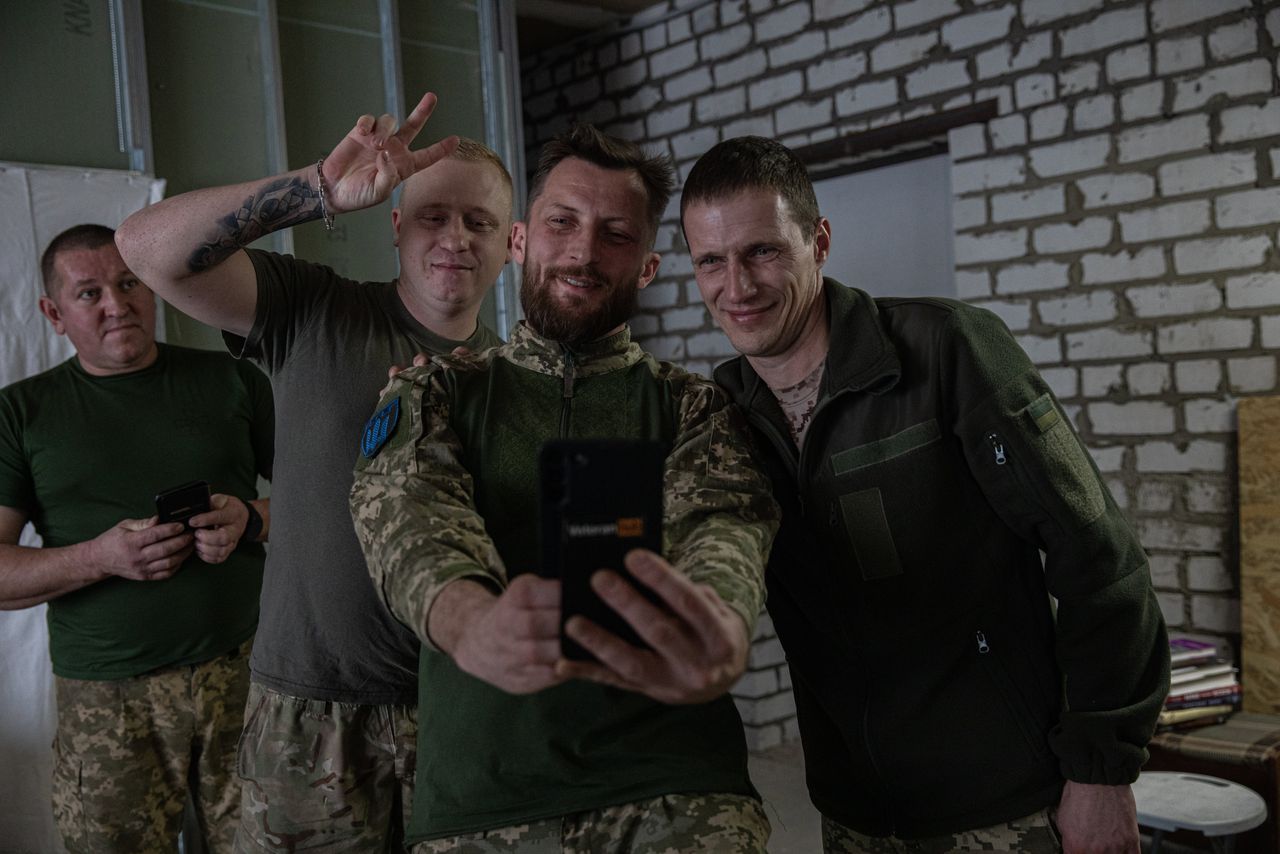
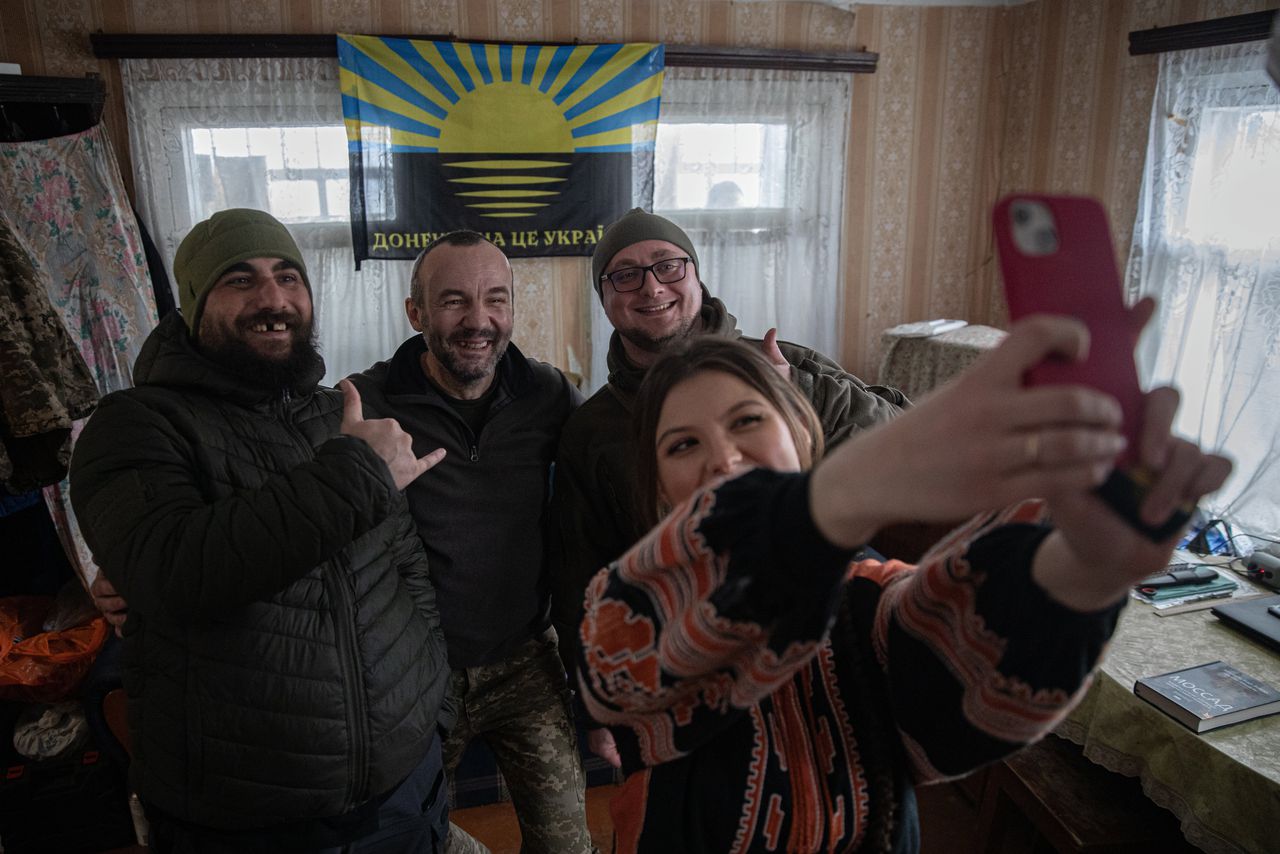
Photo Kostyantyn Chernichkin
Cultural forces
There is distraction for more than an hour, which is good for mental health. The six soldiers are absorbed in the artists' visit and after the performance they share their thoughts with them. For a while they are no longer dependent on each other. To illustrate their circumstances, Kovtalyuk looks around at the three beds in the living room. “That's how we live. On each other. Cut off from others.” Private Vladislav (32) adds: “The music reminds us that we are people and we used to go to concerts.”
Later, in the passenger bus, Bondarchuk explains that he is acting out of solidarity with the soldiers. “I don't want these guys to be forgotten. They are very important for the country. I want to give them the feeling that they are not alone and that we are together. We are a big tribe, a big family.”
Bondarchuk has been fighting the Russians since 2017 and knows the situation at the front, the cold in winter, the muddy trenches, the dead comrades and the loneliness. “You have no contact with the outside world and think that everyone has forgotten you and no one needs you. You feel alone. I sing to cheer them up.”
The performance is in line with the goal of the so-called 'Cultural Forces', an association that organizes the performances and to which the five musicians have committed themselves. Well-known and lesser-known artists, all active within the Ukrainian armed forces, have joined the Cultural Forces and are playing in homes, military hospitals and liberated areas, totaling more than three thousand performances. It aims to raise morale, reduce the distance between civilians and the military, and increase national consciousness.
The four male musicians, including accompanist Artur Temchenko (36), all have a professional musical background, a requirement to participate, and know the war intimately. This means they know how to hit the soldiers better. After the Russian invasion of 2022, Remez, Soljar and Temchenko enlisted in the defense forces. Now they perform two to three times a day five days a week, but they can be called up for war at any time. In addition to Kharkiv province, the other Ukrainian provinces along the front, Donetsk, Luhansk, Kherson and Zaporizhia, have traveling musicians.
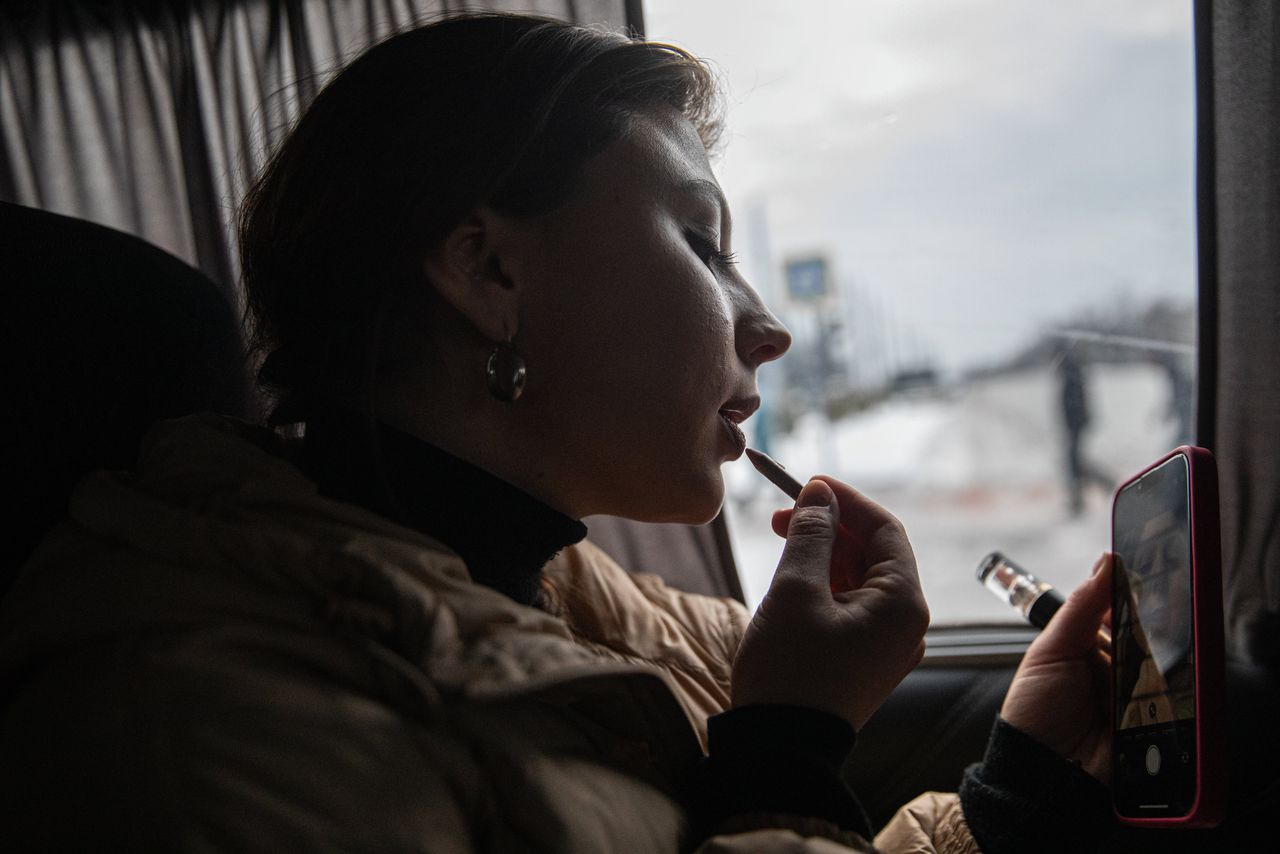
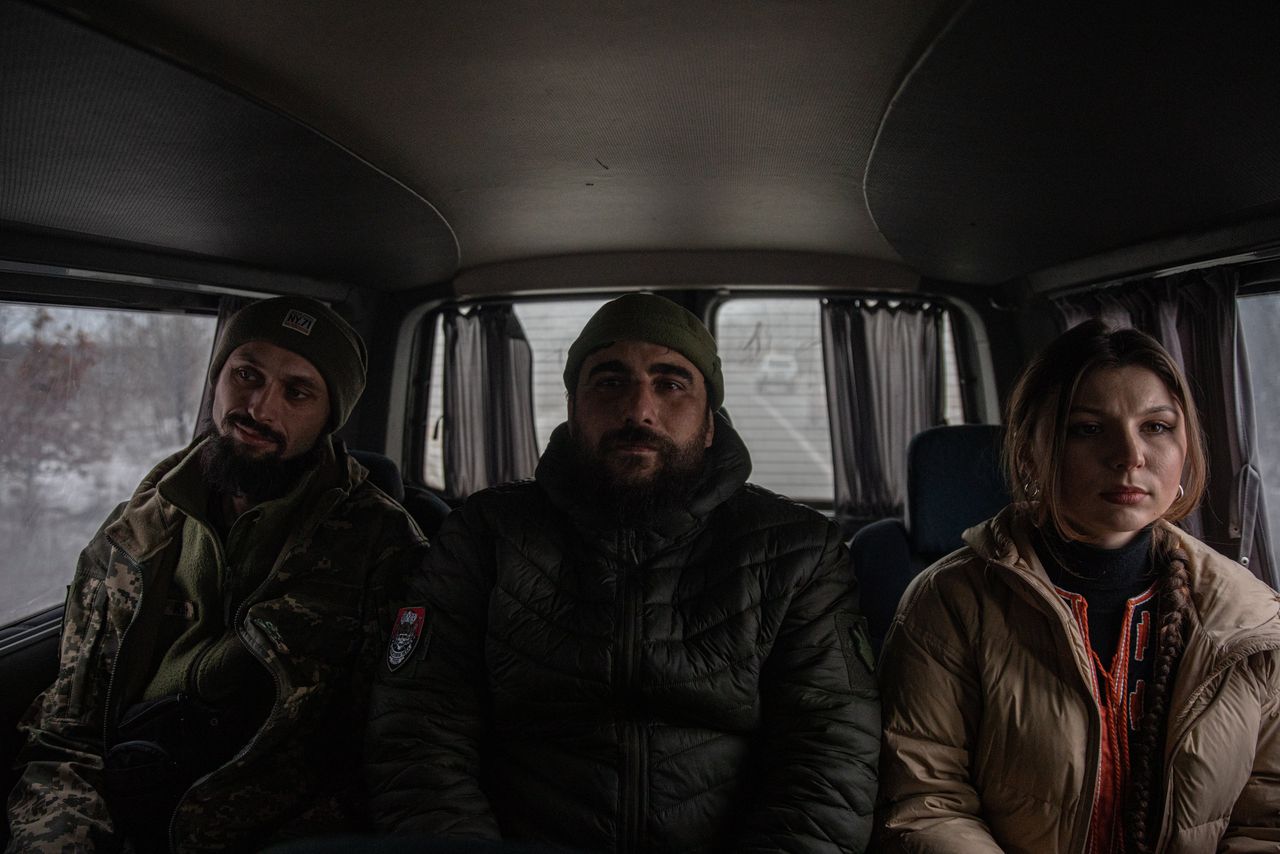
/s3/static.nrc.nl/wp-content/uploads/2024/01/05105923/data109775397-d48b23.jpg)
Emotionally blocked
In the civilian home, the five musicians see that their performance is popular with the soldiers. They thaw. The facial expressions change with each song. The soldiers show their emotions more and more during the performance. It's not often you see soldiers like this in war. At the front, the war is paramount and there is no room for expressing emotions. In the passenger bus to the next music performance, Remez turns around excitedly from the passenger seat. “Did you see their faces change? They were hit. It functions.”
Also read
'Oj oe luzi chervona kalina' is the second national anthem of Ukraine
/s3/static.nrc.nl/bvhw/files/2022/11/data93236567-890955.jpg)
It works less on the second performance of the day. In a not completely finished building, the nine soldiers do not easily surrender to the music. Two hardly look at the musicians and stare half-slouched at the ground. Nothing on their faces reveals what they think. As if they are emotionally blocked. Five claps timidly, no more than that. Only the commander and a gray-haired soldier laugh every now and then. “Sometimes the soldiers do not respond at all,” says Remez afterwards. “Then we don't know what they think about it.”
Ultimately, Maks manages to get the soldiers loose with his rap songs. The hands go up in the air:
“Our end will not come soon
Our hearts still can
Thousands of hearts ignite
Our candle hasn't burned out yet
Our youth is still within us
Ukraine, Ukraine!
Your son's faithful heart
Is at your feet.”
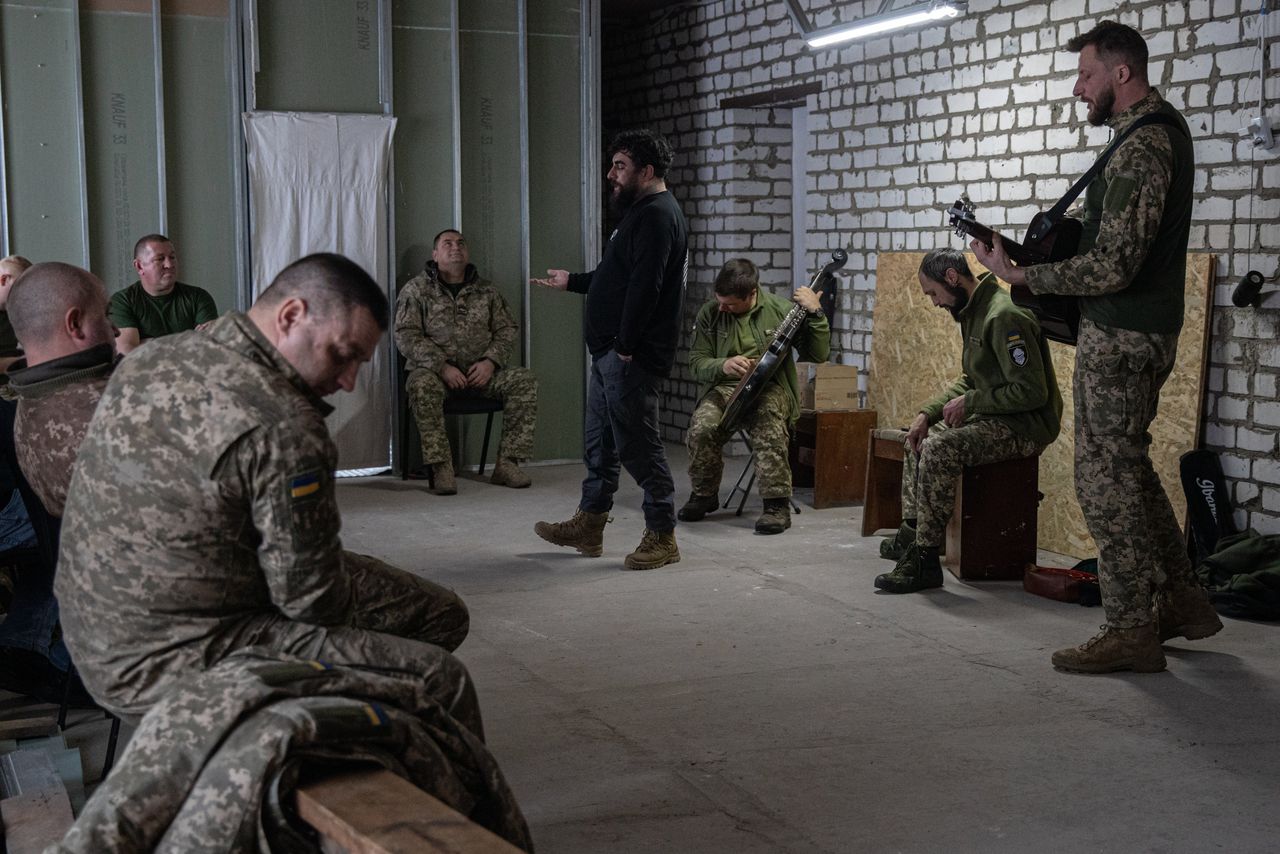
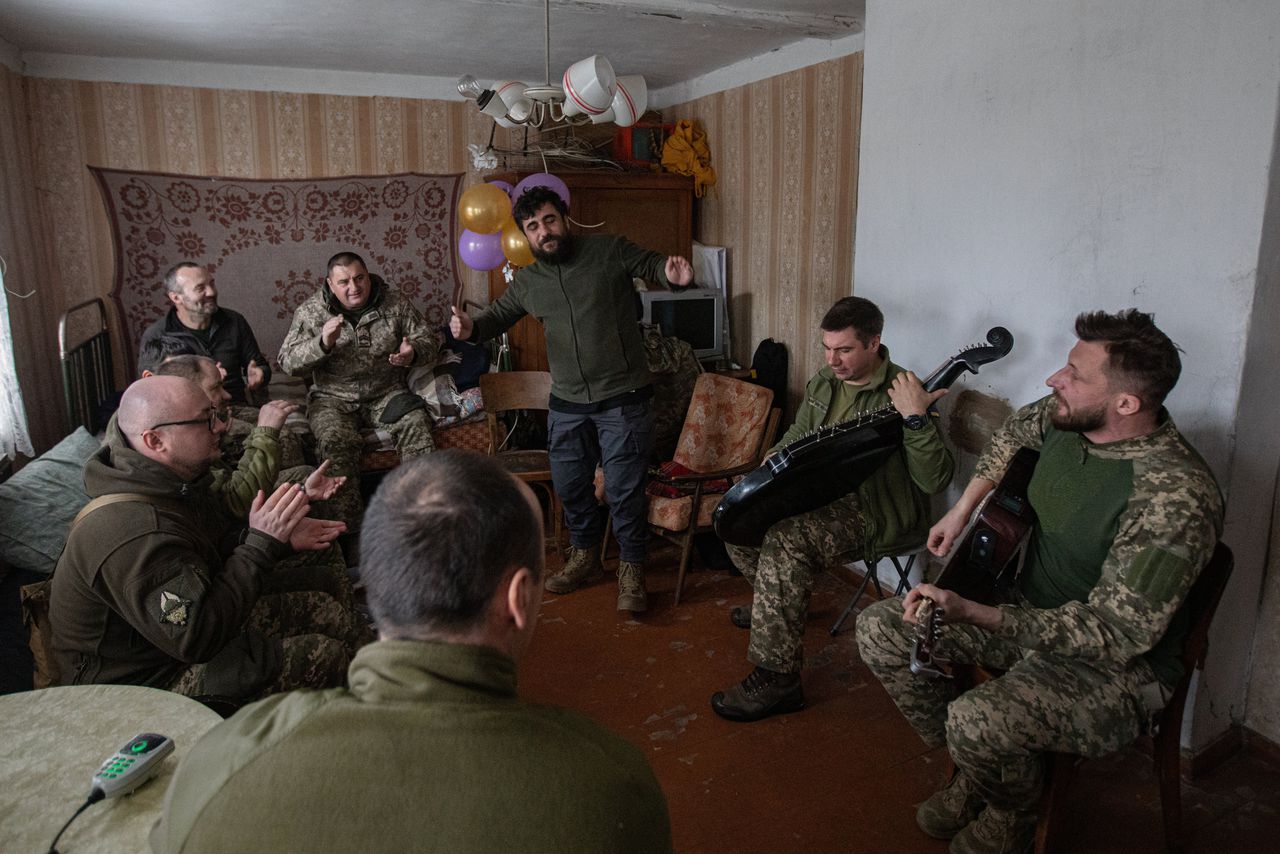
Photo Kostyantyn Chernichkin
#music #reminds #human #Ukrainian #soldiers
